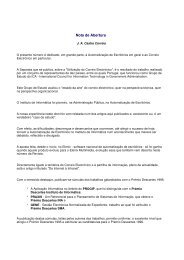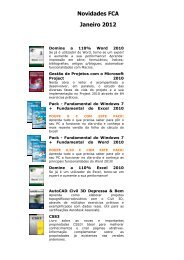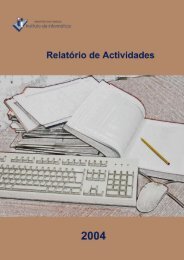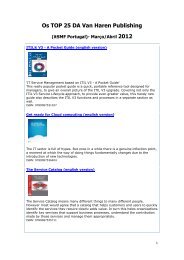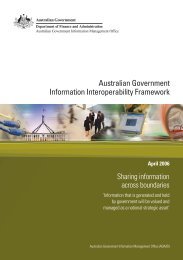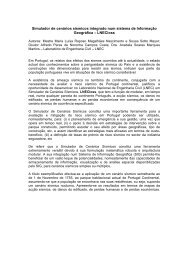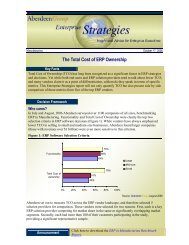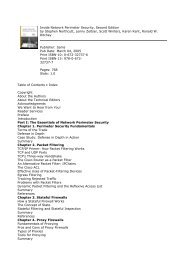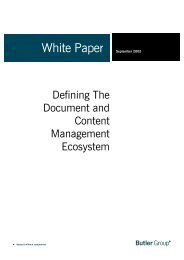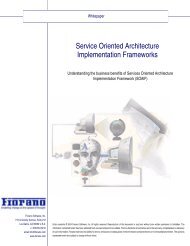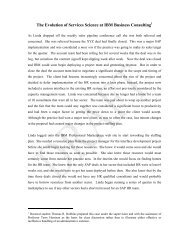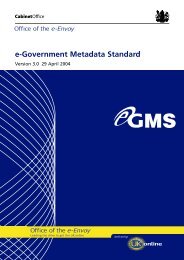OECD Peer Review of E-Government in Denmark - ePractice.eu
OECD Peer Review of E-Government in Denmark - ePractice.eu
OECD Peer Review of E-Government in Denmark - ePractice.eu
Create successful ePaper yourself
Turn your PDF publications into a flip-book with our unique Google optimized e-Paper software.
Figure 3.6 Technological challenges to e-government implementation<br />
Adjustment to rapid technological<br />
development<br />
Implementation <strong>of</strong> authentication<br />
and/or public key <strong>in</strong>frastructure<br />
Shar<strong>in</strong>g standards and <strong>in</strong>frastructure<br />
among agencies<br />
Implementation <strong>of</strong> <strong>in</strong>formation systems<br />
and network security<br />
Compatibility issues between different<br />
technological platforms (UNIX,<br />
Micros<strong>of</strong>t, Oracle, Apple, LINUX, etc.)<br />
Difficulty <strong>of</strong> establish<strong>in</strong>g portals for<br />
onl<strong>in</strong>e services <strong>in</strong>volv<strong>in</strong>g several public<br />
organisations<br />
Technical implementation <strong>of</strong> privacy<br />
measures (privacy architecture, privacy<br />
enhanc<strong>in</strong>g technologies, PET, etc.)<br />
Weak telecommunications<br />
<strong>in</strong>frastructure<br />
0% 20% 40% 60% 80% 100%<br />
Very important challenge Important challenge Somewhat important challenge<br />
Not an important challenge Not a challenge (has been mastered) Not a relevant challenge<br />
Source: <strong>OECD</strong> E-<strong>Government</strong> Survey: <strong>Denmark</strong>.<br />
Digital divide<br />
The “digital divide” was ranked lowest among barriers to e-government exam<strong>in</strong>ed <strong>in</strong> the <strong>OECD</strong><br />
survey. While it was perceived as a “very important” challenge by about 4% <strong>of</strong> respondents, nearly<br />
60% regarded it as be<strong>in</strong>g unimportant. In l<strong>in</strong>e with the survey results, the digital divide was also the<br />
issue least mentioned <strong>in</strong> <strong>in</strong>terviews. Nearly everyone who met with the <strong>OECD</strong> dur<strong>in</strong>g this review<br />
either failed to mention the digital divide, or regarded it as present<strong>in</strong>g very little challenge to<br />
e-government.<br />
Despite statistical data <strong>in</strong>dicat<strong>in</strong>g that <strong>Denmark</strong> ranks high <strong>in</strong> terms <strong>of</strong> <strong>in</strong>dividual access to ICT,<br />
some differences persist <strong>in</strong> the basic determ<strong>in</strong>ants <strong>of</strong> access levels. Look<strong>in</strong>g at access to the Internet <strong>in</strong><br />
particular, some key differences can be observed:<br />
• Age: older people have lower levels <strong>of</strong> access to the Internet. While Internet access rema<strong>in</strong>s<br />
relatively high under the age <strong>of</strong> 60 (with less than a 10% difference between ages 16-19 and<br />
ages 40-59), it decl<strong>in</strong>es considerably over the age <strong>of</strong> 60. People over the age <strong>of</strong> 60 have the<br />
lowest Internet access rate (54%).<br />
• Education: the level <strong>of</strong> Internet access <strong>in</strong>creases with the level <strong>of</strong> education. While 96% <strong>of</strong><br />
university students have Internet access, only 72% <strong>of</strong> primary and lower secondary school<br />
students do. However, <strong>Denmark</strong> ranks well above the <strong>OECD</strong> average <strong>in</strong> terms <strong>of</strong> the number<br />
<strong>of</strong> pupils per computer used for learn<strong>in</strong>g purposes at school (<strong>in</strong> 2002 there were seven pupils<br />
per computer, and n<strong>in</strong>e pupils per computer with Internet access).<br />
55



